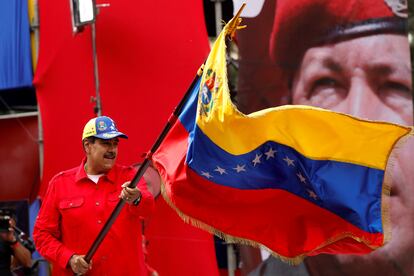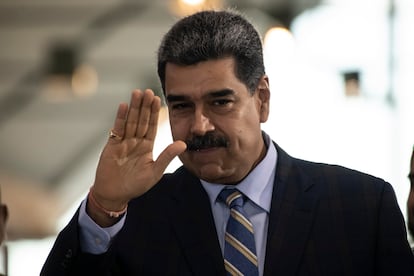Nicolás Maduro, 11 years on: unpopular, but comfortable in power
The president, whose leadership cast many doubts after Chávez named him successor, has a clear path to cling onto power for another six years thanks to a Chavista-controlled framework

The picture seems to have been created in an oil painting workshop for retirees, but what is important here is not its artistic value, but its significance. It portrays a mustachioed Nicolás Maduro in a blue shirt clutching with both hands the rudder of a ship on which the following can be read: “República Bolivariana de Venezuela” (Bolivarian Republic of Venezuela). Behind, a huge Jesus Christ with an exposed heart on a violet robe rests his left hand on Maduro’s shoulder and holds one side of the steering wheel with his right. The image is somewhat reminiscent of the scene of Kate Winslet and Leonardo DiCaprio on the deck of the Titanic. The sentiment of the painting does not leave much room for interpretation: Maduro runs the country under divine guidance.
The president has proudly shared the portrait on social media. At the age of 61, the successor appointed by Hugo Chávez when his life was in the balance is more entrenched in power than ever. In his heart of hearts he may believe that there is something divine and miraculous about it, but the truth is much more mundane: the former bus driver of the Caracas transportation service has leveraged the top-down Chavista framework, the destruction of institutions, military support and the intelligence services to prop himself up in the presidential seat. He has now been in power for 11 years and is likely to remain there for another six after the elections that will be held on July 28 without the participation of his main rival, María Corina Machado, who has been invalidated by the Chavista legal framework in order to pave the way for Maduro. The president is publicly confident of the mobilization of the Chavista base, which has been victorious in Venezuela’s elections for 20 years, based on his revolutionary rhetoric. However, given that he possesses an abundance of astuteness and intuition, he is not foolhardy and he is not afraid to go head-to-head with Machado, even though he would surely face defeat — Machado is ahead of him in the polls.
In person, Maduro is intimidating because of his 6′ 2″ height and his friendliness, as contradictory as this may seem. He taps his interlocutors on the shoulder, jokes with them, and makes wisecracks that are laughed at out of a sense of commitment. He is affectionate in public with his wife, Cilia Flores, who he refers to as his companion and comrade. He claims to despise the media, especially the international press, but he is aware of everything that is published about him. This is also the case on social media, where his son, Nicolás Maduro Guerra, keeps him informed. In private, according to those who have spoken to him, he can be despotic. More than one ambassador has been reprimanded by him without them scarcely being able to articulate a word. Former presidents who sometimes attempt to mediate between Chavismo and the international community are kept waiting for hours and days to receive them. He is obsessed with being assassinated, and has denounced more than 20 plots against him. The attorney general, Tarek William Saab, has taken this to task by arresting opponents and human rights activists under the vague accusation of terrorism.
When Hugo Chávez passed away in 2013 and Maduro was installed as president, many seriously believed that the Bolivarian movement had very little time left at the helm of the country. Many felt he lacked the charisma and authority to replace one of the Latin American leaders who would truly leave his mark on history. Alongside Chávez, Maduro seemed like a marginal figure. He was a dithering successor, clearly not up to the task, with fewer qualities than his predecessor and mentor, and at the same time he had to face a burgeoning opposition movement, ready to seize its golden opportunity of a national majority from the hands of Chavismo.

Eleven years and almost two presidential elections later, navigating an economic and social storm of his own making, determined to establish the socialist model at all costs, still sanctioned by the international community, Maduro has seen how the Chavismo movement has gradually lost social support, yet, as a strong man in a made-to-measure framework, he still enjoys comfortable control of power. The United Socialist Party of Venezuela (PSUV), the ruling party, has picked him as its candidate for the 2024 elections, which came as no surprise. A year ago, there was talk of Chavista forces criticizing his administration, but challenging his power can be costly. No one is untouchable and anyone can be purged. Exactly one year ago, he removed one of his most trusted men, Tareck El Aissami, vice-president of the economic area and minister of Energy and Petroleum, which entails a lot for an oil-producing nation. At Petróleos de Venezuela (PDVSA), the state-owned company, a hole was discovered that some sources estimate to be worth $3 billion, representing a mammoth case of corruption. A year after that, without knowledge of the judicial situation facing him due to the opacity of the public prosecutor, there is no news about El Aissami. The earth seems to have swallowed him up.
“Maduro started very badly. He did not envision himself with such responsibility. The 2013 electoral result against Capriles, where he almost lost the elections, reflected him. In spite of that, the Chavista roots in the state, in the public powers and in the military sector were evident,” says Luis Salamanca, political scientist and doctor in Social Sciences at the Central University of Venezuela.
The arrival of Maduro exacerbated corruption in the Venezuelan state, which acquired a systemic dimension thanks to the exchange control. Instead of attempting an economic opening, as many proposed, Chávez’s successor, dogmatized and skeptical of the capitalist economy, opted to radicalize, and toughened the policy of nationalizations and taxation of commerce and industry. The measures led to severe shortages of goods and services and soaring prices. In 2014, huge social unrest boiled over and popular anger took to the streets.
In a nation crumbling in the face of unviable economic policies, Maduro provided his adversaries and followers with continuous demonstrations of strength of character and command. “Maduro’s strength is a consequence of a power structure conceived by Chávez. It begins with the president and descends in a hierarchical line that imitates democratic formulas on paper, but transforms the structures of the constitutional rule of law. Maduro is the head of a power-state,” explains Salamanca. Exercising repression — and in private, acting despotically among his collaborators when necessary — Nicolás Maduro, without authority in the eyes of the rest of the country, quickly established himself as the new leader of Chavismo, albeit without competition.

Armed with shrewd negotiating skills and an aptitude to work with intelligence agencies, Maduro continued with Chávez’s mandates, and invested heavily in expanding the Bolivarian Police force, the National Guard, as well as paramilitary agencies loyal to the cause, further strengthening the artillery aspect of the revolution. “Under Maduro the destructive trend of the productive apparatus initiated by Chávez, especially the collapse of PDVSA, has continued,” says Diego Bautista Urbaneja, lawyer, writer and member of the National Academy of the History of Venezuela.
“Oil prices fall, social programs go bankrupt due to corruption. Without popular support, and without the same amount of money, he has to strengthen the apparatus of revolutionary power, a framework of party, state, government, armed forces, militias, volunteers and party members. Power begins to be exercised relentlessly and without any ethical, juridical or ideological barriers,” says Urbaneja. The consolidation of Maduro’s power is now a reality as a result of the efforts of two of his most important key players: the Minister of Defense, Vladimir Padrino López, a military figure with firm roots in the barracks, who has been promoting revolutionary military ideas in the institution for years; and Jorge Rodríguez, the current president of the National Assembly, his political operator par excellence. Added to this is the work of Diosdado Cabello, the second most powerful man in the regime, an authority in the party and state security, who, contrary to popular belief, is not an enemy of Maduro’s institutional framework, but one of its guarantors as a radical spokesman and defender of the back line.
“The unrestricted use of the apparatus of power, that is the cause, there is no mystery in that,” Urbaneja points out. “The democratic forces have an inferiority complex with Chavismo, attributing supernatural political virtues to it. There is a perpetual power provision within the state, a political body that in order to continue to exist, if it has to spy, it spies; if it has to shoot, it shoots; if it has to accuse, it accuses; if it has to imprison, it imprisons; if it has to negotiate, it negotiates. It could be the Supreme Court of Justice, the National Guard, the PSUV, the SEBIN (Bolivarian Intelligence Service), the CLAP (Local Committees for Supply and Production) bags, or the collectives.” To this end, the international support of allies like Russia, Cuba, China and Iran has been instrumental in strengthening an infallible and unusually effective intelligence apparatus.
In the last year, Maduro had insinuated through his negotiators at the dialogue table with the opposition, set up in Mexico, that he was willing to embark on a democratic path and begin a transition in the country. This was perceived in the Barbados agreements, where it was felt that Chavismo was prepared to hold free and fair elections. The White House sought to encourage Venezuela by lifting sanctions on oil and gold, providing a respite for its ailing economy.

Sign up for our weekly newsletter to get more English-language news coverage from EL PAÍS USA Edition
Tu suscripción se está usando en otro dispositivo
¿Quieres añadir otro usuario a tu suscripción?
Si continúas leyendo en este dispositivo, no se podrá leer en el otro.
FlechaTu suscripción se está usando en otro dispositivo y solo puedes acceder a EL PAÍS desde un dispositivo a la vez.
Si quieres compartir tu cuenta, cambia tu suscripción a la modalidad Premium, así podrás añadir otro usuario. Cada uno accederá con su propia cuenta de email, lo que os permitirá personalizar vuestra experiencia en EL PAÍS.
¿Tienes una suscripción de empresa? Accede aquí para contratar más cuentas.
En el caso de no saber quién está usando tu cuenta, te recomendamos cambiar tu contraseña aquí.
Si decides continuar compartiendo tu cuenta, este mensaje se mostrará en tu dispositivo y en el de la otra persona que está usando tu cuenta de forma indefinida, afectando a tu experiencia de lectura. Puedes consultar aquí los términos y condiciones de la suscripción digital.








































